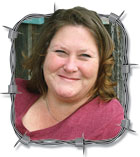 I hate to admit it, but a 4-year-old seriously schooled me at a fair I recently attended.
I hate to admit it, but a 4-year-old seriously schooled me at a fair I recently attended.
As I was walking through the barn, I saw the adorable little boy helping his dad get a freshly washed sheep ready for the upcoming show.
The family graciously allowed me takes some photos of the young man as he used a round curry comb on the wool of the sheep as it stood on the stand.
I asked the young man if he was going to show the ewe later that day. The child then gave me a puzzled look and said, “It’s not a ewe, it’s a ram. He’s a boy.”
Yes, I had failed to notice the boy parts. The men around the child and I erupted in laughter, and I had to admit the tot was right. After a high-five and a fist bump between the young showman and I, as well as me showing him the pictures I had just taken, I was forgiven for my snafu.
While it was a bit embarrassing to get corrected by a 4-year-old, I can see that young man becoming one of the strongest advocates for agriculture in the future. At only 4-years-old age, he wasn’t afraid to set the record straight, and we will need more young people like him in the coming decades.
Many other young agriculture advocates are blazing a path for the boy. Those advocates are a just a little older than him, and they could also be found on the fairgrounds that day. The youth in today’s agriculture world have to deal with many more questions than we did as young people. We weren’t bombarded with questions about antibiotics, GMOs and animal rights. Most of the time it was trying to explain that brown cows didn’t give chocolate milk, which is something my generation apparently failed at according to some news reports a few months ago, and the difference between a heifer and a cow, a bull and a steer.
I had the opportunity to talk with several area FFA members at that same fair. Some of the members were interested in the science of agriculture, including one young man who grew up in town and has never lived on a farm or been around livestock, while others say they love working with their livestock and being hands-on with their SAEs.
If given the opportunity, I’m sure each one of those FFA members could easily answer questions from the public about agriculture; and do so in a very educated and eloquent manner.
I ran into a young woman I’ve known since she was a baby. She will be a sophomore in college this fall, and her mom expressed how proud she was of her daughter for really being an advocate of animal agriculture, especially since she was attending a private, liberal arts college where there just aren’t very many farm kids. The mom said her daughter has a knack for explaining about farming and agriculture in a way she never could. The college student was excited for her roommate from the year before to come to the fair and watch her show.
“She’s a vegetarian, but she’s really nice,” the young woman said of her former roomie.
When the young woman arrived, there were chuckles about being at a livestock show, yet being a vegetarian. The young woman, who hails from suburban Kansas City, Mo., just smiled and said she might be a vegetarian, but not because of any kind of animal rights agenda; she just likes veggies. I will put that one up in the “win” column for my young friend.
When I see our future generations, I hope our young agriculturalists will stick to their roots and continue to spread information about the benefits of agriculture, and the need for our farms of all sizes to continue.
Today’s young people are the pivotal generation for agriculture in our country; kind of the make or break generation, and from what I am seeing of our young agriculture leaders, we’re going to be all right.
Julie




